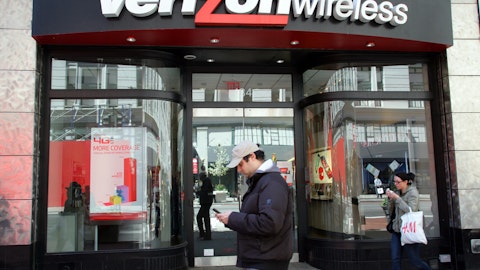Our best-in-class core businesses are well-positioned to execute on our strategic objectives. We will continue to Harness One Goldman Sachs to serve our clients with excellence, run world-class differentiated and durable businesses, and invest to operate our businesses at scale. Additionally, the execution focus areas we’ve identified for 2024 will help us drive the outcomes of delivering for clients, our people, and our shareholders. With that, we’ll now open up the line for questions.
Operator: Thank you. Ladies and gentlemen, we will take a moment to compile the Q&A roster. [Operator Instructions] We’ll go first to Glenn Schorr with Evercore.
Glenn Schorr: Hi. Thanks very much. So I wanted to get a mark-to-market. You’ve been rightfully cautious but optimistic on green shoots becoming reality in investment banking. You definitely saw some momentum in the fourth quarter. So curious — and you mentioned that the pipeline is up quarter-on-quarter. So maybe just differentiate between what you’re seeing on the corporate side versus sponsor side and just get the mark-to-market on how you’re feeling. Thanks.
David Solomon: Sure. Sure, Glenn. I mean, just at a base level, I’m pretty optimistic, given the way we’ve got the firm positioned. And there’s no question that these capital markets and M&A activity levels have been depressed. As I’ve said before, I don’t think that continues year-on-year-on year, and we really started to see, in the second half of this year, real improvement. As Denis highlighted, the M&A backlog saw a really strong replenishment and improvement in the fourth quarter. And I’d just highlight, and I know this is obvious, but I think it’s worth stating, we put up $1 billion of M&A revenue. If the backlog is growing, that means we’ve got to replace the $1 billion that we put up, plus then have growth. And so, that’s a very, very strong replenishment.
And I would just say the level of strategic dialogue has definitely increased and we’re seeing it across our platform. I’m encouraged by capital markets activity. I’m not going to say, it’s running back to 10-year averages right away, but it has materially improved. I do think you’re going to see some more meaningful IPOs in 2024. And we are just, across debt and equity issuance, seeing more activity, more engagement. At the end of the day, people had done a lot of funding that takes them out for a period of time, but they’ve got to start thinking about their capital structures and accept the reality of the market, and we’re seeing that come through. So when I look broadly, it feels better. There’s a lot going on in the world. And so I think one of our jobs is to always be a risk manager and worry 98% of the time about the 2% of things that can go wrong.
So we’re going to continue to take a cautious view in terms of the overall operation of the firm, but I do think the firm is incredibly well-levered to this pickup, and it feels better is the way I’d frame it.
Glenn Schorr: All right. Cool. Maybe just to follow-up on that note. Reducing the on-balance sheet investments, as you mentioned, is an important part of the ROE improvement for Asset & Wealth and for Goldman overall. So with that said, the markets are higher, pipeline’s better. How come the balance sheet reduction of on-balance sheet investments might be slower this year when the intent, I think, is to get rid of all of it at the right price?
David Solomon: Yeah, first of all, I think we made a lot of progress last year. And so if you look at what we accomplished, I think what we accomplished last year was pretty meaningful, especially given the environment. One of the things that happened is we pulled some stuff forward that we didn’t expect to monetize in 2023 — into 2023. And so to be clear, our focus is to get that to zero as quickly as possible. If you’re operating inside this firm and you’re operating in that business, you feel enormous focus on reducing that as quickly as possible. But we want to make sure that we manage expectations appropriately. We set a clear target over the next three years to get to zero. My guess is, we’ve got a good shot if we executed doing that quicker than that.
Glenn Schorr: Fair enough. All right, thanks, David.
David Solomon: Yeah.
Operator: Thank you. We’ll go next to Ebrahim Poonawala with Bank of America.
Ebrahim Poonawala: Hey, good morning.
David Solomon: Good morning.
Ebrahim Poonawala: I just wanted to spend some time on the FICC business. So if I’m looking at the right numbers, it feels like FICC revenues are now back to pre-COVID levels if you go back to 1Q of ’19. Maybe if you can unpack it, just looking at slide 13, seemed like most products were quite weak. Give us some perspective around does both — the intermediation piece of FICC, does that feel like we are close to trough, and unlike seasonality, we should see some improvement in FICC from here, if you can just provide some perspective there.
David Solomon: Sure. I mean, at a high level, what I would say, this quarter, intermediation activity was quiet, and particularly in the back half of the quarter, kind of late November and December, clients were quiet. If you look at the whole year, I don’t think it’s fair, I don’t have the numbers in front of me, but I don’t think it’s fair to say the whole year is back to ’19 levels. The overall activity levels were up and down during the year. We have a big diversified business. When our clients are active, we execute on it, we continue to grow the financing revenues, which make it overall more durable. But it was a quiet quarter, particularly the back half, in terms of intermediation. I don’t expect it to continue at that pace.
I think Denis’ comments in the opening, we’re seeing more activity in the first few weeks of the year. But we’ll watch it. And as you know, that activity, particularly in that segment, can move up and down based on what’s going on in the macro environment.
Ebrahim Poonawala: Got it. And maybe just sticking to FICC or maybe both FICC and Equity. On the financing side, if you don’t mind reminding us of the opportunity to grow financing over the next year or over the medium-term. Thank you.
Denis Coleman: So, thanks, Ebrahim. So we’ve been clear over the last several years that we see opportunities to grow both FICC and equity financing. And it’s a virtuous activity for us. It dovetails well with our focus on clients and our focus on market share. We have a lot of expertise in this space and we see a lot of demand from clients for us to deploy both into FICC and equities. We now have leading equities franchise overall. Our equities financing business is in a leadership position and at scale. It has grown significantly and we continue to see opportunities to increase the activities that we do with our existing clients and bring new clients on the platform. So we look out into 2024 and 2025. We continue to be very focused. I think there’s good opportunities across both FICC and equity financing in GBM.





